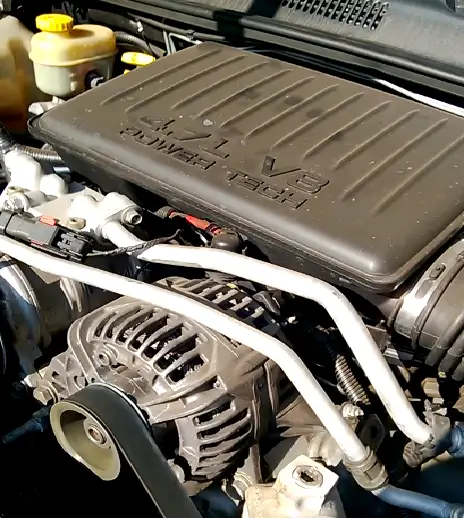The Jeep 4.7L engine has also been a favorite of Jeep owners over the years, powering cars like the Grand Cherokee and the Commander. But is Jeep 4.7l engine a good or bad engine? While it has gained itself a reputation as being strong and powerful, it also has its own disadvantages that would-be buyers need to be aware of.
In this blog post, we are going to talk about the advantages and disadvantages of this engine based on some key points such as reliability, fuel economy, problems, and performance. At the end of it, you will know better whether this engine is appropriate for your Jeep or not.
1. Overview of the Jeep 4.7L Engine
The Jeep 4.7L engine, which was introduced in the late 1990s, powered some of the Jeep models like the Grand Cherokee, Cherokee, and Jeep Commander. Renowned for delivering power coupled with reliability, the 4.7L engine is one of Jeep’s models. The engine was designed to cater to both drivers and off-road drivers.
This engine features a V8 layout, which is quite a horsepower and torque rich engine with great towing and off-road driving capabilities. It has gained a reputation for stout power under adverse conditions, but it does have its limitations.
2. Pros of the Jeep 4.7L Engine
In terms of performance, the 4.7L engine boasts several features that have made it a jeep lover’s favorite. The engine is typically appreciated for its performance on both road and off-road situations, and it offers a blend of power and fuel economy. Some of its key benefits are mentioned below:
- Power and Performance: The 4.7L engine has a fair 235-260 horsepower, plenty of torque, making it ideal for towing and off-roading. It is a reasonable foundation for Jeep’s rugged performance demands.
- Fuel Efficiency: Although larger engines consume more fuel, the 4.7L engine is quite fuel efficient considering its size. On the highways, it provides better mileage than larger V8 engines, which saves on fuel in the long term.
- Longevity and Endurance: When properly maintained, the 4.7L engine’s durability can extend its lifespan significantly. Jeep owners have been able to reach over 200,000 miles on the engine, and as such, it is a great engine for long-term use.
3. Disadvantages of the Jeep 4.7L Engine
Despite its advantages, the 4.7L engine has long been criticized for possessing certain inherent flaws that make its total reliability and maintenance problematic. Some of the most common problems associated with the engine are given below:
- Common Engine Problems: Certain Jeep owners have reported problems like cracked cylinder heads, warped intake manifolds, and oil leaks. They can cost a lot to repair and affect the engine’s overall reliability if not addressed.
- Fuel Economy Issues: Even though the 4.7L engine is more economical compared to the bigger V8 engines, it consumes more gasoline than the smaller engines such as the 3.7L. The drivers will need to refill more often than expected, especially when cruising in the city.
- High Maintenance Costs: Jeep 4.7L engine has high maintenance costs due to its complex nature. Parts like timing chains, seals, and gaskets wear out, and expensive repairs are needed which typically have to be done in order to keep the engine running.
4. Is the Jeep 4.7L Engine Long Term Reliable?
One of the most important factors in determining any engine is its reliability, and the Jeep 4.7L engine has had mixed reviews throughout the years regarding this factor. Some owners are amazed at the toughness of the engine, but others have encountered severe problems that render the engine less reliable in the long run.
- Real-World Longevity: The life expectancy of the Jeep 4.7L engine is between 150,000 and 200,000 miles, depending on driving conditions and maintenance. Some cars have fewer issues, but others will be ruined due to its design flaws.
- Maintenance Guidelines: Maintenance is required at regular intervals to ensure long-term dependability. It entails oil change, immediate repair for normal wear and tear, and replacement of such parts as the timing chain or gasket seals. Keeping this up can extend a long lifespan to the engine.
5. Jeep 4.7L Engine vs. Other Jeep Engines
How does the 4.7L engine compare with other well-known Jeep engines like the 3.7L and 5.7L engines? Let’s take a closer glance:
- Performance Comparison: The 4.7L is more torquey and powerful than the 3.7L, and it is suited for towing and off-road use. It falls short of the 5.7L, however, in overall power and tow capacity, especially in heavier-duty use.
- Fuel Efficiency Comparison: The 4.7L engine strikes a balance between fuel efficiency. It offers better mileage than the 5.7L engine but consumes more gasoline than the 3.7L, especially on urban roads. The 3.7L is most economical and hence the most fuel-efficient option for regular commuting.
6. Should You Buy a Jeep with the 4.7L Engine?
If you’re planning to purchase a Jeep with the 4.7L engine, you need to weigh all the advantages and disadvantages before making a decision. While the engine provides good performance, it will not be for everyone.
- Things to Consider by Buyers: If you’re a person who prioritizes off-road ability and towing capacity, the 4.7L engine provides an even balance. Nevertheless, if fuel efficiency and minimal maintenance are high on your list, you might want to opt for a less powerful engine.
- Is the 4.7L Engine Worth the Investment?: For people who will be using their Jeep for off-road driving or towing, the 4.7L engine is a good value. But for people who will be doing mostly city driving or are on a tight budget, the maintenance costs and gas mileage could make other engines more desirable.
FAQ’s
Q1: What are a few of the most common problems with the Jeep 4.7L engine?
- Some common complaints about the 4.7L engine include cracked cylinder heads, failing timing chains, and oil leaks, along with problems with the intake manifold gasket. These can lead to very costly repairs if they aren’t diagnosed early.
Q2: Is the 4.7L engine more fuel-efficient than other Jeep engines?
- The 4.7L engine has pretty decent fuel economy compared to other big engines such as the 5.7L HEMI, but it may not be as efficient as smaller motors such as the 3.7L, especially in city driving conditions.
Q3: Is the Jeep 4.7L engine effective for off-road driving?
- Yes, the 4.7L engine is more than adequate in power and torque for off-road drivers, so it’s a good choice for light to moderate off-roading. But more powerful engines might be better suited for extreme off-road use.
Q4: How expensive is it to keep a Jeep with the 4.7L engine?
- Maintenance on the Jeep 4.7L is quite expensive due to its typical issues, including oil leaks and replacing the timing chain. Good maintenance and quality parts will manage expenses in the long term.
Q5: Is it advisable to buy an old Jeep with the 4.7L engine?
- If you’re buying a used Jeep with the 4.7L engine, it’s essential to check for common issues, including engine leaks and the condition of the timing chain. Pre-purchase inspection by a good mechanic is highly recommended.”
Q6: What’s the difference between Jeep 4.7L and 3.7L engines?
- The 4.7L engine offers greater torque and power than the 3.7L engine, so it’s better suited for towing and off-road performance. However, the 3.7L engine might be more gas-efficient and less of an issue in terms of reliability.”
Q7: Is the 4.7L engine suitable for towing?
- Yes, the 4.7L Jeep engine has a satisfactory towing capability, generally ranging from 3,500 to 5,000 pounds, varying with the model. This is suitable for towing smaller to medium-sized trailers and equipment.
Conclusion
While the Jeep 4.7L engine is a solid performer with lots of power, it isn’t without its drawbacks that can exclude it from being the perfect engine for every buyer. Excessive engine problems and higher maintenance costs are something to consider when buying.
Ultimately, whether it’s a good or bad engine really depends on your own needs and necessities. If you require a combination of power and strength, then 4.7L would be your answer, but if you need better fuel economy and less maintenance, others would be better for you.

Hello there, this is Thomas Byrd. I am a professional car mechanic who leads a team of junior mechanics in a repair and restoration shop. In the beginning, I used to work for a jeep service center as a basic worker. From there I keep learning, changed my job 2 times and now I am a professional who leads a group of mechanics. Though a have expertise in the jeep, I know very well about all types of cars. To share my knowledge and skills with others I have created this blog website. Whenever I get free time from work I give my time to my blog.

